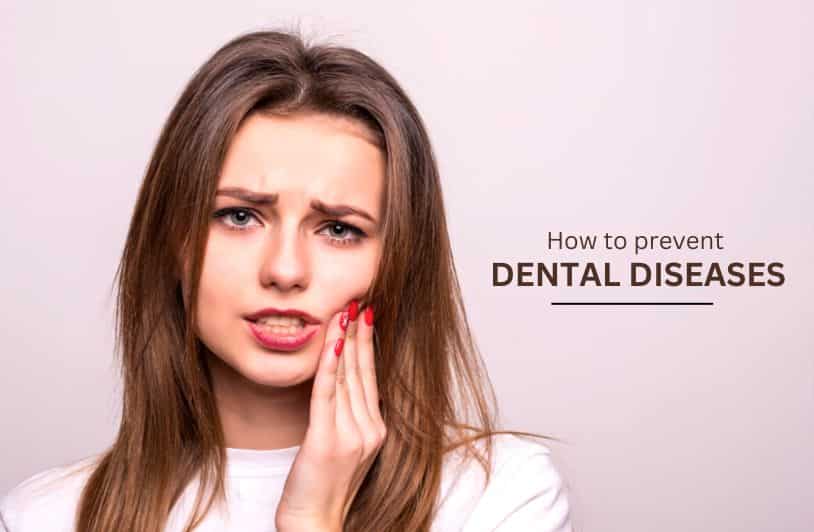Dental diseases affect the mouth, mostly the gums and teeth. Dental diseases are among the most prevalent conditions that affect humans. These conditions often do not present symptoms, so they go unnoticed, especially in their early stages. In the later stages of dental diseases, they cause irreversible damages.
However, you can easily prevent complications from dental diseases if you detect the condition on time and visit a dental hygienist often to clean your teeth. Your dental hygiene is important, and taking proper care of your teeth is one of the best ways to prevent dental diseases.
You need to also know these dental diseases, how they affect the mouth and steps to prevent these diseases from damaging your teeth and gums.
Gingivitis
Gingivitis usually results from the accumulation of plaque between the teeth. It is an early stage of gum disease and causes gum inflammation,other common signs of gingivitis include redness and bleeding of gums.If you do not treat gingivitis and get rid of the accumulated tartar, it could damage the gum, leading to infection ad severe gum disease.
A common cause of gingivitis is poor dental hygiene, but other risk factors such as hormonal changes resulting from pregnancy. Diabetes and existing illnesses may cause gingivitis.
You can prevent gingivitis by brushing your teeth often, at least two times daily, flossing your teeth and using a mouth wash. Regular cleaning by a dental hygienist and dental examination can also help to prevent gingivitis.
Caries
Dental caries also called cavities, and tooth decay causes bone and tooth decay. This dental disease is one of the most chronic dental conditions. It results from a bacteria acting on carbohydrates and sugars contained food we eat.
The bacteria in the mouth convert sugar and carbohydrate to acids which etches the surface of the teeth by removing minerals and calcium from the teeth. This process is known as demineralisation. If you do not floss and brush properly, the plaque and acid will remain in your teeth, preventing remineralisation.
As the bacteria remain and move into your teeth, it causes decay. You can prevent caries by improving your oral hygiene, which involves brushing at least two times daily and even between meals. You can also prevent caries by limiting your intake of carbohydrate foods and those containing simple sugars and using a fluoride mouth rinse.
If you are pregnant, diabetic or have any condition that reduces your salivary response, ensure you inform your dentist, so you can take extra caution to prevent caries.
Abscess teeth
Abscess tooth occurs when pus affects a tooth, or the tooth becomes infected. The pus usually gathers in a sac due to bacterial infection, which does not drain properly. The bacteria usually results from tooth decay or caries that remain for long without treatment. Gum disease, root canal treatment or having a cracked tooth may also cause an abscess.
You can prevent abscess by taking proper care of your teeth. Brushing and flossing your teeth every day, and undergoing routine professional teeth cleaning will prevent teeth abscess. Ensure you drink water regularly or chew sugar-free gums to prevent dryness in the mouth as this may cause tooth decay and abscess.
Gum disease
Gum disease, also called periodontal disease is a collective name for any gum disease or condition. Gum diseases have two categories. The first is gingivitis and then advanced periodontitis.
Gum diseases often cause inflammation, tooth loss and loss of gum tissue. Sometimes, it damages the bone supporting the teeth. When you have a plaque on your teeth, but fail to remove them, by brushing and flossing your teeth, the plaque would accumulate between your gums and teeth, causing gum disease.
Other factors like smoking, diabetes, certain medications, genetics, hormonal changes and some illnesses could cause gum disease.
Common ways to prevent gum disease include using a mouth wash, having routing dental cleaning, flossing and brushing your teeth everyday. If you have an existing health condition like diabetes, ensure you treat it and inform your dentist about it. Ceasing smoking would also reduce the risk of developing gum disease.
If you have gum disease, your treatment will depend on the cause of the condition. Gingivitis treatment involves the dentist scraping off the accumulated plaque around your gumline. However, with periodontitis, the dentist will have to scrape off the tartar and plaque below the gumline and on the teeth, which may be uncomfortable. Periodontitis treatment usually requires a local anaesthetic, and you may need to take antibiotics because of the increased risk of infection. If you have any dental diseases, it would be best to get treatment as soon as possible to prevent further complications in your oral and general health. If you do not have dental disease, ensure you visit Dentalhygienist.london to have your regular dental cleaning to prevent any dental condition. Give a call today on 020 3137 5055 to schedule your regular dental cleaning.

